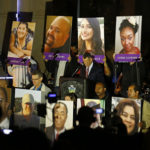WASHINGTON (RNS)—After a car bomb detonated on Wall Street killing 38 people, federal investigators came up with a possible link to an overseas group.
Islamic terrorists? Al-Qaida? No, Italian anarchists.
The year was 1920, and in those days anarchists were the equivalent of today's terrorists, waging acts of mass destruction against Western capitalism.
Charles Kurzman, professor of sociology at the University of North Carolina, thinks 20th century anarchist violence bears a resemblance to the Islamic terrorism of the 21st century in one sense: Neither resulted in a spiraling escalation of violence.
"In many ways," said Kurzman, "Islamic terrorism is simply the latest form of transnational revolutionary violence to grab global attention."
Put another way: This too shall pass.
While mindful of the pain and suffering terrorism has caused, Kurzman has written a book challenging the dominant narrative that worldwide terrorism is out of control.
In The Missing Martyrs: Why There Are So Few Muslim Terrorists, Kurzman argues Islamic terrorism has accounted for a miniscule number of murders compared with violent death tolls from other causes.
In the United States, for example, fewer than 40 people died at the hands of terrorists in the 10 years since the attacks of Sept. 11, 2001. That compares with about 140,000 other murders during the same time.
Sign up for our weekly edition and get all our headlines in your inbox on Thursdays
The bad news, said Kurzman, is Islamic terrorists really are out to kill Americans. The good news is there are very few of them. In fact, of less than 40 killed at the hands of terrorists over the past decade, none were tied directly to al-Qaida. These include the 2002 Beltway sniper attacks, in which 10 people were killed in the Washington, D.C., area, and the 2009 Fort Hood shootings in which U.S. Army Maj. Nidal Malik Hasan killed 14 people.

|
That count does not include the many failed terrorist bombings united by a common theme—incompetence. Had these plots, such as the bungled 2010 Times Square car bomb, succeeded, the death toll would have been much higher.
The truth is, Kurzman said, the more terrorists kill, the less popular they become. That does not mean the world is safe from terrorism, and he cautions America may well see another horrific terrorist attack.
It does mean the U.S. government should examine the evidence and ratchet down the discourse, he said.
That goes for the Muslim radicalization hearings held by Rep. Peter King, R-N.Y., as well as presidential candidate Herman Cain's statements that he would require Muslim government appointees to take a loyalty oath.
"The narrative right now is that Islamic terrorism is either no threat at all, or it's a pandemic throughout the community," said Alejandro Beutel, government and policy analyst for the Muslim Public Affairs Council.
"Charles Kurzman's very scholarly approach to the issue is something we want to move toward. There is a threat out there, but it's a tiny minority of individuals."
What, then, of the supposed sympathy for terrorist acts among Pakistanis or Palestinians, among whom Osama bin Laden has been a popular figure?
Borrowing a term from author Tom Wolfe, who coined the phrase "radical chic," Kurzman calls it "radical sheik," playing on the Arab word for "leader." It's an expression of resistance against Western imperialism, a kind of sign of disdain for power and authority, not an actual vote of confidence for terrorism.
A sociologist of revolutions, who has spent a large part of his academic career studying the 1979 Iranian Revolution, Kurzman is active with the Triangle Center on Terrorism and Homeland Security. The center is a think tank consisting of experts from Duke University and the University of North Carolina. He was the principal author of a recent study that showed the number of U.S.-instigated terrorist incidents dropped by more than half in 2010.
Several years ago, Kurzman started taking Arabic courses so he could do a better job reading al-Qaida propaganda and digital bulletin board discussions by young Muslims.
He knows his argument that there are few Muslim terrorists is counter-intuitive, even provocative.
But the Harvard- and Berkeley-trained professor is convinced it's a necessary corrective.
"It may be a hard sell to ask people to calm down," Kurzman said. "It doesn't make as compelling a read as scary stories and imminent threats of hidden dangers. …
"I'm not saying terrorism is insignificant, or that I have no feelings for people who have lost loved ones due to terrorism.
"But I think we should also look at the days when nothing happens. This is a story about something that did not occur."














We seek to connect God’s story and God’s people around the world. To learn more about God’s story, click here.
Send comments and feedback to Eric Black, our editor. For comments to be published, please specify “letter to the editor.” Maximum length for publication is 300 words.